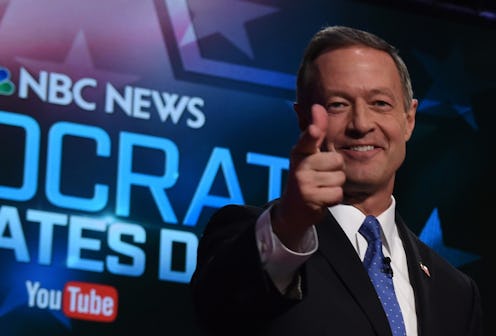News
O'Malley's Closing Statements Were Likely His Last
Democratic presidential candidate Martin O'Malley has proven that he's got the right stuff in debates past. He's been articulate, and aggressive when necessary, and has come across as an all-around pretty lovable guy. Despite all these top-notch qualities, O'Malley's debate performances have existed perpetually in the shadows of those of frontrunner candidates Hillary Clinton and Bernie Sanders. And with him only just making the cut to participate in Sunday night's fourth Democratic debate, O'Malley's closing statements may have been his last opportunity to give American voters his plans for the presidency.
O'Malley has displayed plenty of perseverance in lasting this long on the campaign trail, with only a small number of supporters to keep him going. He just barely made the cut for this fourth round between the Democratic candidates. Fortunately, the former Maryland governor was able to snag a 5.2 poll rating in Iowa, one of the two states where a 5 percent average was needed in order to get an invite. But O'Malley's joining in on the Sunday night round was arguably not worth it. His debate performance overall was strong enough, but audiences in South Carolina and viewers at home didn't see a whole lot of it.
Being the kind of look-on-the-bright-side fellow that O'Malley is, when moderator Lester Holt told candidates that they had one more opportunity to say anything during closing statements, he still gave that sweet smile of his. But he and everyone else at the event knew quite well that if anyone had missed out on touching on the issues throughout the event, it was O'Malley.
There was too much left unsaid, and O'Malley joked that one minute for a final statement just wasn't enough.
... We're going to have to get 20 minutes to do it, so.
Because of his serious lack of speaking time, his closing statements were, at first, pretty scattered.
There are so many issues we haven't been able to discuss here.
O'Malley brought up both issues that are touched on regularly by candidates and ones that are basically unknown to the general public: immigration reform, the threat of nation state failures in the Western Hemisphere due to drug trafficking, and the negative impact that hedge fund investments have had on Puerto Rico. The candidate then realized that those 20 minutes would not be a reality, and gave a last attempt at a broad vision for an O'Malley administration:
I guess the bottom line is this. Look, we are a great people the way we act at home and abroad based on the beliefs that unite us. Our belief in the dignity of every person, our belief in our own common good. There is no challenge that is too great for us to overcome provided we bring forward in these divided times new leadership that can heal our divides here at home and bring our principles into alignment abroad.
In contrast to his opening statement, O'Malley didn't ask for the American people's vote. He concluded by remarking on the need for unity in order for the country to successfully move forward.
We're on the threshold of a new era of American progress and I believe we have only need to join forces together and cross that threshold into a new era of American prosperity.
Though the sentiment was nice, O'Malley might have done better to use all 60 seconds to repeat his opening line, which simply asked for votes.
